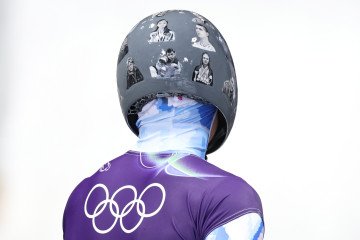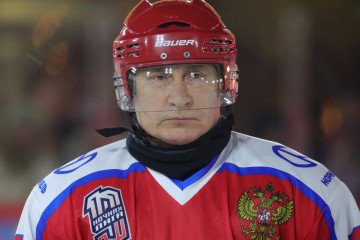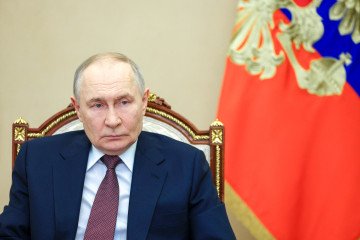- Category
- Anti-Fake
All the Terms You Need To Know to Spot Russian Propaganda

The Kremlin seeks to control not only Ukraine’s territory but also the very words used to describe its own war crimes. Through a propaganda campaign straight out of Orwell’s “1984”, Russia has tried to erase civilian suffering, demonize its victims, and silence dissent.
In George Orwell’s novel “1984”, the totalitarian regime of Oceania creates a new chilling form of manipulated language—called “Newspeak”—for its citizens to use. It consists of strict rules and made-up vocabulary intended to control people’s minds. Its main purpose is to eliminate nuance and eradicate inconvenient truths, serving as a critical tool of oppression. This is best felt through one of the intentionally contradictory slogans of the fictional ruling party: “War is Peace. Freedom is Slavery. Ignorance is Strength.”
Russia’s contemporary propaganda apparatus appears to have taken “1984” not as a warning but as an instruction manual in its brutal, unprovoked war against Ukraine. Like Big Brother, the Kremlin seeks to weaponize language, controlling information and obscuring its war crimes through the words its uses.
Its propaganda “dictionary” is a linguistic smokescreen deployed to deceive, stifle dissent, and paint a warped justification for its atrocities. Its entries echo Orwell’s most sinister linguistic manipulations, exposing the depths of the Kremlin’s desperate disinformation campaign. By understanding these tactics—and the key terms that expose Russian propaganda—you can help yourself and others see through the disinformation.
War is Peace
Russia’s war against Ukraine isn’t labelled as such; it’s always referred to as a mere “special military operation.” This Orwellian euphemism minimizes the scale and devastation of Russia’s aggression. “Operation” conjures images of clinical precision, a stark contrast to the horrifying spectacle of a full-scale invasion. In an even more grotesque inversion, the occupation of Ukrainian territories is deceitfully termed “liberation.” Ukrainian communities are portrayed as welcoming Russian invaders with open arms, despite the stark realities of forced deportations, torture and widespread acts of violent resistance against occupation forces.
Freedom is Slavery
Fuelling the Kremlin’s war machine is a deluge of manufactured narratives designed to vilify Ukraine. Ukrainians are baselessly branded “Nazis.” In even more outlandish propaganda, they’re labelled “Satanists.” These demonizations serve to dehumanize an entire nation, justifying the unjustifiable and portraying Russia as engaged in a struggle against evil. The Ukrainian government, freely elected by its people, is dismissed as the “Kyiv regime.” This seeks to undermine the legitimacy of Ukraine’s leadership and mask widespread global support for its cause.
This relentless distortion of reality extends to horrific war crimes. Faced with evidence of a bombed maternity hospital, a destroyed theater, or levelled neighborhoods, Russian propaganda insists these were disguised “military bases.” It aims to erase civilian suffering and negate the deliberate targeting of non-combatants. To deny Ukrainian victims their basic right to be recognized as civilian casualties is to perpetuate an assault against their humanity.
Ignorance is Strength
Beyond redefining warfare, Russia’s propaganda actively suppresses alternative viewpoints and critical thinking. Independent reporting contradicting the Kremlin’s carefully crafted tales is swiftly denounced as “fake.” Draconian legislation has criminalized the spread of so-called “disinformation”—any information that contradicts or challenges the official government narrative. Offenders face up to 15 years in prison. This suppression of truth leaves people trapped in a distorted echo chamber, their only option to consume the state-sanctioned version of events. Dissent becomes perilous. Critics are imprisoned, or worse.
A startling statement by prominent Russian figure Elena Mizulina encapsulates this totalitarian logic: “Prohibition is freedom, and rights are the greatest unfreedom.” With Orwellian precision, this phrase inverts the true nature of freedom. Individual autonomy is vilified. Obedience to the all-knowing pronouncements of the state is heralded as the only freedom worth having.
“Doublespeak” to mask failure and brutality
In Orwell’s novel, “doublespeak” is one of the ways the authoritarian regime controls people’s minds by convincing them that two mutually contradictory beliefs can be correct at the same time. By convincing people that “war is peace”, citizens of Oceania are made to believe that despite being in a constant state of war, there’s also peace.
When Russian military blunders can no longer be denied, its propaganda similarly manipulates language to create a false reality. Troop retreats are not defeats stemming from fierce Ukrainian resistance, but noble “goodwill gestures” or acts of strategic “de-escalation.” Mysterious explosions within Russia itself, potentially acts of internal resistance, are dismissed as laughable “claps.” To cover up a catastrophic and undeniable economic decline under the weight of international sanctions, the Kremlin adopts the absurd euphemism “negative growth.”
By replacing honest, impactful words with absurd fabrications, the Kremlin seeks to eliminate nuanced and accurate discussions of its devastating policies. Much like Orwell’s Newspeak, this is an attack on critical thought—if you cannot name something, can you truly grasp its horrors or advocate against it?
From fiction to devastating reality
The stark parallels between Russia’s propaganda methods and the dystopian vision of “1984” compel us to ask whether the Kremlin seeks to turn Orwell’s work from a cautionary tale into a grim reality. If so, this presents a dire obligation to the international community. Unmasking the deceptive, totalitarian methods behind Russia’s language war is the crucial first step towards exposing and countering its corrosive impacts. This isn’t simply a war fought with weapons; it’s a war waged through words, ideas, and perceptions.
Supporting brave journalists and activists reporting the truth, bolstering reliable Ukrainian voices, and promoting global media literacy are essential to combatting this disinformation. The global audience must see the devastating impacts of this war—unfiltered, undiluted, and without Kremlin-backed spin. Only when the iron curtain of propaganda begins to crumble will words like “surrender,” “trial,” and “reparations” may be spoken, and justice found amidst the rubble.
By pushing back against Russia’s 'Newspeak,' we may prevent history from repeating the terrifying lessons of George Orwell’s masterpiece. Let the spirit of his novel rest secure, knowing that despite the relentless efforts of totalitarian regimes, reality—and human compassion—ultimately fight back.
The cover photo features the Soviet heraldry being removed from the Mother Ukraine monument's shield and replaced with Ukraine's coat of arms, the tryzub. Photo by Vitalii Yurasov (IG: @yurasov.pro.)

-3db1bc74567c5c9e68bb9e41adba3ca6.png)




-f88628fa403b11af0b72ec7b062ce954.jpeg)